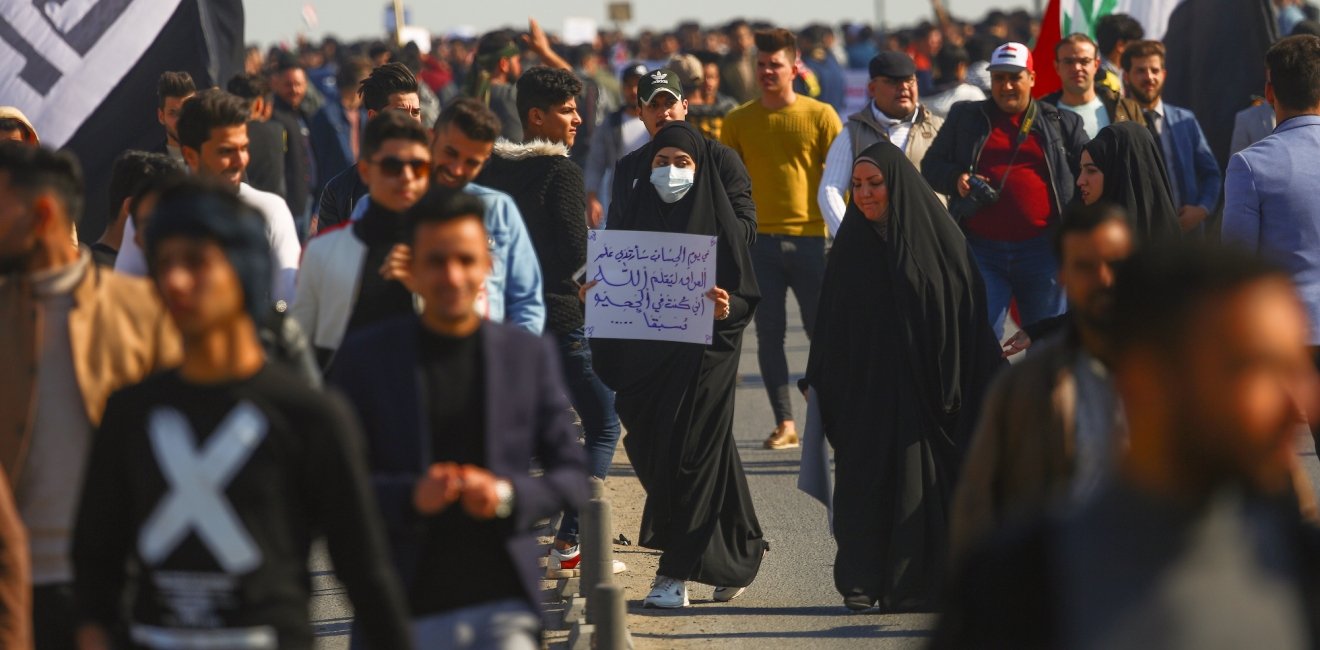
A blog of the Middle East Women's Initiative
...the protest movement in Iraq in 2019 and 2020, which continues today, has mobilized a younger generation of women who will not be satisfied with the status quo.
In 2008, the United Nations Human Rights High Commissioner issued a press release stating: “Violence against Iraqi women continues unabated,” while the world observes from a distance.
As the UN this month marks its annual 16 Days of Activism Against Gender-Based Violence campaign, the violence in Iraq continues in multiple forms, including domestic and sexual, in addition to brutal retaliation for political activism. But through local NGOs and global organizations, the world is now watching from inside the country and documenting the violence and inequalities.
An estimated 1.3 million people in Iraq (out of a population of 40 million) are estimated to be at risk for different forms of gender-based violence, and more than 75 percent of them are women and adolescent girls. 77 percent of reported incidences are linked to domestic violence; although, Iraqi experts on the ground say many cases go unreported largely because the perpetrators are unlikely to be punished.
Article 41 of the Iraqi Penal Code grants men the right to discipline their wives and children. In such patriarchal societies as Iraq, the line between “discipline” and violence is thin. In addition, there are no domestic violence laws, making it almost impossible for victims to file complaints with police. In the absence of a law making domestic violence a crime, many victims fear that contacting law enforcement will only mean more punishment at home.
Many Iraqi laws still do not comply with the Convention on the Elimination of All Forms of Discrimination Against Women (CEDAW), which the country ratified in 1986. Even in cases of murder, article 409 of the Penal Code states that the punishment for a man who kills or beats his wife or female relative is only up to three years in prison. And, a judge, who is usually male, has the discretion to reduce the sentence to as little as six months.
As with many countries in the MENA region, domestic and sexual violence are among the highest in the world, according to the World Bank. At least 35 percent of women in MENA have experienced some form of violence by an intimate partner during their lifetime – placing MENA second highest in the world. In all probability, even this figure is even higher because of lack of reporting and public discussion.
In Iraq, such social ills are still considered taboo subjects, making it difficult for local NGOs to help women address the problem. According to statistics published by the Iraqi Ministry of Planning, which were reported by the Iraq News Agency in 2021, violence by a husband against his wife includes economic violence (22 percent), verbal abuse (12 percent) and physical violence (3.6 percent).
“Honor killings” – which are committed across the MENA region generally by men when they think a female family member has violated social or religious norms -- remain widespread in Iraq, in part due to lack of legislation to prevent and punish them. Further, penal codes all but encourage them by allowing mitigated sentencing for murder in certain cases, according to a 2020 report prepared for the UN Human Rights Committee.
Groups such as Women Network in Iraq, Organization of Women’s Freedom in Iraq, and Iraqi Women’s Rights Organization – all created over the last 10 years – are drawing attention to the problem and calling for the parliament to enact a law against domestic violence. However, they face enormous obstacles primarily because the parliament is often comprised of MPs from religious parties who argue that such laws would destroy the social fabric of the Iraqi family.
Socially conservative views about women, how they dress and behave still permeate Iraqi society, often causing women who wish to express their desire for a different lifestyle to pay the price. In 2018, a spate of killings of high-profile women demonstrated the push back. One woman, 22-year-old Tara Fares, a model, former beauty queen, and social media star who had tattoos and was photographed with heavy makeup and revealing attire, was shot dead in Baghdad. She had 2.7 million followers on Instagram.
Women’s increased political activism, particularly their participation in the national protests in 2019 and 2020, also provoked patriarchal violence against them on the one hand and more liberation on the other. A small number of women created the “pink and purple protest” and staged sit-ins overnight, disobeying curfews. They protested in the streets even in the face of attacks by security forces. Many women were sprayed with teargas, threatened, assaulted, and in some cases killed.
According to the report published in April 2020, which was prepared for the UN Human Rights Committee, Iraqi state security forces and Iranian-backed militias were killing, beating and kidnapping women and girls, including human rights defenders and medics, at the height of the protests.
Despite all this violence, there is unlikely to be new legislation to protect women. But it is clear that the protest movement in Iraq in 2019 and 2020, which continues today, has mobilized a younger generation of women who will not be satisfied with the status quo.
Author


Middle East Program
The Wilson Center’s Middle East Program serves as a crucial resource for the policymaking community and beyond, providing analyses and research that helps inform US foreign policymaking, stimulates public debate, and expands knowledge about issues in the wider Middle East and North Africa (MENA) region. Read more


Middle East Women's Initiative
The Middle East Women's Initiative (MEWI) promotes the empowerment of women in the region through an open and inclusive dialogue with women leaders from the Middle East and continuous research. Read more

Explore More in Enheduanna
Browse Enheduanna
Women are the Catalysts for Change in Lebanon

How Education Can Empower Young Women in MENA


